- Home
- Ben Stevens
The Sumo Wrestler (An Ennin Mystery #33)
The Sumo Wrestler (An Ennin Mystery #33) Read online
The Sumo Wrestler
Almost everyone had heard of Kato already, of course. The famous 350-pound, six-foot rikishi – sumo wrestler – who cared little for etiquette or tradition, destroying his opponents the length and breadth of Japan as he rose rapidly up the sumo ladder. He frequently liked to indulge in sake (which still never affected his performance in the dohyo – the semi-circular ring), which also on occasion caused him to grab male well-wishers by their genitalia, leading them yelping around some inn or other such place.
On another occasion – again at an inn, where Kato was staying the night – a foreign customer in the room next to his dared complain about the noise late in the evening, coming from Kato’s room where the massive rikishi was busy entertaining some geisha. Kato promptly settled the matter by throwing the gaijin out of a second-floor window. For a while, it seemed as though the man might die from his injuries, and when he at last recovered Kato was obliged to pay a significant amount of money in damages.
Not that he cared. Still under thirty, he was already extremely wealthy, and could thus well afford to ‘pay off’ anyone who suffered because of his drunken behavior. In the dohyo, meanwhile, he rarely bowed to or even acknowledged his opponent – something for which he was regularly reprimanded, though much he cared for that – and, moreover, often waved one clenched fist in the air, when he won a match.
Such behavior is, of course, entirely anathema in the world of sumo. Even if a rikishi has just won a match for which they have been in training for many months, against their ultimate opponent, they are still expected to display no more emotion than if someone had simply informed them that it is raining outside. But Kato was a law unto himself, and completely unstoppable. His unbelievable arrogance was matched only by his sheer physical power, and all those who found themselves in his way (both in the dohyo as well as outside of it) were mercilessly dealt with.
And now, today, in a gigantic tournament building containing several thousand spectators, Kato stood the chance of becoming yokozuna – the highest rank in sumo. Traditionally, yokozuna have had to conduct themselves with extreme dignity at all times; yet no one was expecting any such behavior from Kato, if he happened to win today. His opponent was a powerhouse from Hokkaido, quiet, respectful and apparently teetotal – in every way the opposite of Kato.
The atmosphere was charged, here inside this huge tournament building. My master and I had come to this city of Osaka to investigate a string of suspicious deaths – of moneylenders, those wealthy men who are still so despised and belittled by the samurai class for their conspicuous greed. My master (whose ethics are often like those of the samurai) would not have touched this case, but the wife of one of the dead men had travelled especially to see him, and while performing a full kneeling bow, her voice choked with tears, had begged for his assistance.
And so we had spent several days quietly looking into the deaths of the seven men, which had all occurred within the space of a year. Several had died in their beds… Another one had been found slumped at his desk, having suddenly expired in the act of counting out a sum of money… All appeared to have suffered some sort of massive heart attack or stroke, although they were not all old, or obese, as moneylenders are typically portrayed in such things as novels and theatrical performances.
My master’s skillful investigations into this matter had exposed a number of unsavory details – one married man had several mistresses, for example, while another had a predilection for teenage boys – but nothing which suggested that the deaths of the seven moneylenders had been anything other than natural.
But seven such men? And all in the space of one year? This surely stretched the boundaries of coincidence too far…
…I was distracted from my thoughts by the arrival of Kato and his opponent into the dohyo, over which was suspended a roof resembling that of a Shinto shrine. My master and I were sat on cushions very close to the ring; a high-ranking city official had learned of my master’s presence in Osaka, and had immediately offered him (and thus me) two of the finest ringside seats in the house.
We’d been kept well-supplied with food and sake while awaiting the arrival of Kato and the other would-be yokozuna, other, lower-ranking sumo fighting for the entertainment of the several thousand people present.
After this match was finished, the city official had declared his intention of taking my master and me to visit one of Osaka’s finest artists, who, it was said, could make any scene using an array of colored thread, utilizing a remarkable wooden frame which she – and the man who mixed the many dyes for her thread, and in general apparently acted as her assistant – had constructed.
…But here was Kato, and his opponent. The atmosphere was fully-charged, although the noise from the huge crowd gathered at once died down. The opponent threw salt around his side of the dohyo, symbolically purifying it, while Kato merely crouched low on his haunches and glowered at his opponent, his stare stating quite clearly –
I am ready when you are.
Both men were wearing the stiff, mawashi wrestling belts, while Kato was just slightly of larger build. Finally, his opponent squatted down opposite him, the men both touched their fists upon the ground – and at that they charged against each other, surely meeting with the force of two colliding bulls.
Kato favored utilizing a series of lightning-fast, almost karate-like chops, while his opponent attempted to get a grip of Kato’s mawashi, which would thus enable a throw to be performed. The seconds ticked by – already this sumo match was lasting an unusually long time – and it started to become obvious that Kato’s opponent stood a strong chance of winning.
Ignoring the blows raining down upon his shoulders, he managed to grasp Kato’s mawashi… With awesome strength he lifted Kato almost onto his toes, and began to turn in for a throw… All seemed lost for Kato…
And then, all at once, the opponent seemed to stagger slightly, and his hands fell away from Kato’s mawashi. So close was I sat to the dohyo, that I could distinctly see the opponent’s eyes roll in his head – for he was facing me. And then he collapsed, although Kato attempted to make it look as though he’d skillfully thrown the man.
There was instant uproar, the crowd going wild with delight. Seat cushions rained down in and around the dohyo, the many people watching thus registering their pleasure in the time-honored fashion. The gyoji, the referee, waved his fan in Kato’s direction, fruitlessly trying to raise his voice above the din to announce Kato as the victor – and thus a yokozuna.
‘Something’s wrong,’ murmured my master, and instantly I realized that the opponent was not moving, sprawled out upon the floor of the ring. Several men crouched down by his side, and the crowd began to quieten, several thousand tongues now murmuring in confusion and concern. Kato, meanwhile, only held aloft his colossal fists and bellowed his delight; a shocking way for a rikishi – never mind an actual yokozuna – to behave, quite apart from the current circumstances…
Still the opponent was not moving, and I heard one of the men attending to him shout –
‘He’s not breathing!’
My master at once sprang into the ring. He has considerable experience at treating people for various ailments, after all – he once managed to save me from the very plague. (As told in the case entitled Black Death.) But joining the other men gathered around the still body of the wrestler, I saw him give a slight shake of his head, and I realized that there truly was no hope for the man. He was obviously quite dead.
The crowds began to be ushered out, as my master disappeared with the other men into the rooms behind the actual ring, where the various rikishi prepare for their tournaments. I waited in that cavernous h
all that had become quite empty, until finally my master reappeared, together with the high-ranking city official – a dignified-looking man named Suzuki – who was currently acting as our escort. Suzuki’s face now appeared haggard and drawn, while my master appeared pensive, and deep in thought.
‘A sudden death, Kukai – as seemingly ‘natural’, yet contrastingly suspicious, as those other deaths we have so lately been investigating,’ declared my master. ‘Kato’s opponent was a young man, and for all his considerable bulk still apparently in excellent health – and yet, quite suddenly, in the middle of the most important match of his life, he dropped dead.’
‘Then Kato is surely no longer yokozuna,’ I queried.
‘Oh no – he will retain that rank,’ declared Suzuki. ‘We did not realize his opponent was dead until after the end of the match, and so there is no way to say when it was he actually died. A harsh judgment, perhaps, but that is sumo. Fatalities do sometimes occur, and injuries far more often, but every rikishi knows the risks they are running…’
It was on the tip of my tongue to say just what I had seen – the deceased rikishi’s eyes rolling in his head, that is, and the way he’d seemed almost to collapse to the ground – but I was still only my master’s servant, and it wouldn’t have done for me to talk so freely in front of a high-ranking official like Suzuki.
‘In any case, we will now go and see Shige-san, one of Osaka’s finest artists, and attempt to put this whole unfortunate situation behind us,’ declared Suzuki. ‘Incidentally, I don’t know if you are aware, but Shige-san and Kato-san have been ‘in a relationship’, as it were, for quite a while now. Osaka is Kato-san’s home-city, after all; I believe the pair met at some sort of social occasion.’
My surprise at this caused me to say –
‘Surely, then, she would be here, to see him compete in such an important match?’
‘I believe she does not like such a rough sport, and indeed desires for Kato-san to retire. Which, now that he has reached such an exalted rank, he may well do – for such a thing is reasonably common.’
‘Yes,’ said my master, still with that brooding expression. ‘Sumo wrestlers who continue the sport beyond the age of thirty-five, or as old as forty, risk an ever-greater chance of injury, or even death. The advantages of quitting the sport, and slimming down somewhat, while one is still relatively young, are well-known.’
‘A spectacular achievement for Kato-san today, but one that has surely been marred for him by the tragic death of his opponent,’ I ventured.
‘On the contrary,’ returned my master, his tone a little tight, ‘Kato and his entourage are currently in his dressing rooms, celebrating in fine style. He does not seem in the least distressed by the unfortunate fact which has resulted in him becoming yokozuna.’
Suzuki glanced in slight surprise at my master, who by speaking so (and neglecting to add any honorific to Kato’s name) had perfectly transmitted his negative opinion of the triumphant yokozuna.
‘Anyway,’ said Suzuki with a cough, ‘the exit is this way…’
As he walked slightly ahead of us, I again noticed my master’s intent expression. It showed that something had occurred to him, some suspicion, and his mind was currently turning whatever this was over-and-over, trying to make sense of it…
‘Master?’ I couldn’t help but say, almost in a whisper.
‘Kato didn’t put his hands in the salt, before the match commenced,’ returned my master, speaking almost to himself and in a voice so soft I could only just hear it. Suzuki, certainly, wasn’t even aware my master was speaking.
‘He has always distained sumo tradition, and been infamous for his arrogance – but his refusal to ‘purify’ the ring with salt, as every rikishi does almost without thinking prior to fighting a match… I don’t believe he’s ever done such a thing before, for it would certainly have been commented upon…
‘So why today, Kukai? Why…?
2
It was only a short walk to the modest wooden building which served as the workplace of the artist named Shige. As we walked, Suzuki coughed again, clearing his throat, and said a little nervously –
‘Forgive me, Ennin-sensei, but I and several other city officials were just wondering if…’
‘You are referring to the deaths of the seven moneylenders, of course,’ returned my master. ‘Such ‘personal’ information as I have discovered is, of course, available to you, although, so far as I can tell, it bears absolutely no relation to the men’s unexpected and somewhat ‘sudden’ deaths, which have all occurred within the space of just one year.
‘There was just one thing, however…’
Suzuki glanced keenly at my master, whose voice had at once fallen into silence. I also desired to hear what this ‘one thing’ was – for I had accompanied my master during this investigation into the deaths of the moneylenders, and he’d yet to mention anything significant to me…
‘Um… Yes, Ennin-sensei?’ said Suzuki, when my master still did not speak. I felt that my master’s mind was again on the sumo match we had just seen, which had ended so terribly for Kato’s opponent.
‘I was permitted to examine the financial records of three of the men,’ declared my master then. ‘In the four other cases I was either refused outright (by a spouse or senior clerk of the dead man’s business), or some excuse was made.
‘But within those ledgers, those financial records I was allowed to check, I was able to discover that a significant amount of money had been paid out shortly (weeks or at the most a couple of months) before the moneylender’s death. I do not mean that this was recorded matter-of-factly by the moneylender, as an obvious matter of business.
‘Quite the opposite… There were a number of false entries, and other discrepancies which had been made in an attempt to ‘disguise’ what I believe was an illicit loan – from each of the three men whose financial records I was able to check. It required some effort, and, dare I say it, no little ability, for me to be able to see past the deliberate deceptions each moneylender had attempted, in order to keep this payment secret.
‘They were successful and wealthy men skilled at their craft, after all – which frequently strays into assorted ‘gray areas’…
‘And the meaning of this, Ennin-sensei?’ questioned Suzuki.
My master gave a slight shrug.
‘There are any number of rules and regulations governing the dealings between moneylenders and their clients – as you well know, Suzuki-san,’ returned my master. ‘This includes the payment of tax, the amount of which is dependent upon the size of the loan.
‘So it is hardly rare for someone requiring a sizeable loan to attempt to have the moneylender give it to them ‘in secret’ – a transaction which benefits both parties (anonymity for the party needing the loan, and avoidance of tax payment by the moneylender), but which is only viable if the person or persons requesting the loan are significantly trusted by the moneylender to not later try defaulting on the loan, due to there being no physical record of it.’
‘So you mean to say that someone could have asked for such a loan, been given it, and then somehow assassinated the moneylender, making it look as though it was a ‘natural’ death?’ demanded the city official. ‘A fiendish process, which was repeated seven times during the course of just one year – and which could quite possibly happen again?’
‘This would hardly seem to be an impossible hypothesis,’ returned my master carefully, with a quick, curious glance at the city official.
‘Then… How were these men murdered, to make it look as though they’d just died ‘naturally’?’ Suzuki almost begged.
‘Now that I don’t know, having not examined the corpses of the men myself. This might have allowed me the chance to spot the telltale signs of poisoning, for example. Yet such signs as clouded eyes are hardly unknown by anyone else, and also a skilled, practiced poisoner can almost completely avoid such things, just as they can tailor their poison to work almost immediat
ely, or in many hours’ time,’ replied my master.
‘Also,’ continued my master, ‘I do not believe it will be possible, at all, to discover who the secret ‘loans’ were paid to. Which means that whoever might have killed the seven moneylenders, and how, will almost certainly never be known…’
The city official named Suzuki sighed, shook his head, and then pointed a short distance ahead of him.
‘Anyway, there is the sign for Shige-san’s business,’ he said. ‘Let us try and put this whole unfortunate business – the death of Kato’s opponent, as well as the mysterious deaths of the seven moneylenders – out of our heads for just a short while, and enjoy the work of one of Osaka’s finest craftswomen…’
3
We were greeted by Shige’s assistant, a tall, thin man with intense eyes named Tamura, who greeted us cordially and showed us inside.
The building was on two floors, with the ground floor being used by Tamura to mix the powders which served as dyes. These were of such basic colors as red, black, blue and white although Tamura could combine them so skillfully that he claimed he could make well over three-hundred different colors. These powders were put in precise measures into water-filled metal pots at the top of three brick-built ovens, inside of which was placed chopped firewood, taken from a tidy heap in one corner of the room with its stone floor and steamy, smoky atmosphere.
In one such pot, even as Tamura spoke, thread was being dyed a wonderful golden color. It seemed incredible that Tamura could have been capable of producing such a hue, using only the powdered dyes and the boiling water. Truly, he was a master of his art.
‘…So this is how I mix and prepare the dyed thread for Shige-san,’ declared Tamura, who had a low, breathy kind of voice. ‘Now, if you would like, I will take you up to see Shige-san. She is looking forward to meet you, Ennin-sensei – we hear so much about you, here in Osaka.’

 Hostile Genus: An Epic Military Sci-Fi Series (Invasive Species Book 2)
Hostile Genus: An Epic Military Sci-Fi Series (Invasive Species Book 2)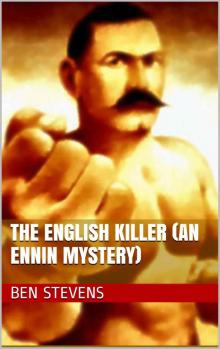 The English Killer (An Ennin Mystery) (The Ennin Mysteries Book 31)
The English Killer (An Ennin Mystery) (The Ennin Mysteries Book 31) The Ennin Mysteries: Collected Series 1 – 5 (25 Stories) MEGAPACK
The Ennin Mysteries: Collected Series 1 – 5 (25 Stories) MEGAPACK Tokyo Zombie Apocalypse
Tokyo Zombie Apocalypse The Strange Case of the Disappearing Dragon (An Ennin Mystery #32)
The Strange Case of the Disappearing Dragon (An Ennin Mystery #32) I, Hell
I, Hell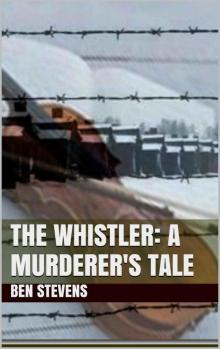 The Whistler: A Murderer's Tale
The Whistler: A Murderer's Tale Parker: The Story of an Apocalypse Survivor: COMPLETE SERIES
Parker: The Story of an Apocalypse Survivor: COMPLETE SERIES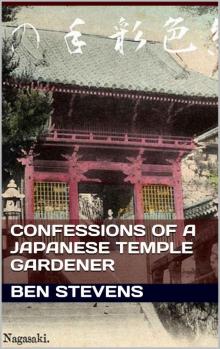 Confessions of a Japanese Temple Gardener: (P.S – Who's from London, England)
Confessions of a Japanese Temple Gardener: (P.S – Who's from London, England)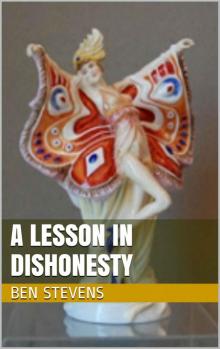 A Lesson in Dishonesty
A Lesson in Dishonesty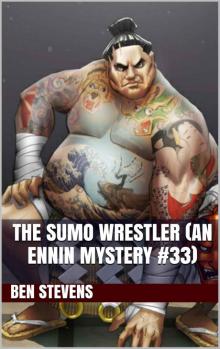 The Sumo Wrestler (An Ennin Mystery #33)
The Sumo Wrestler (An Ennin Mystery #33)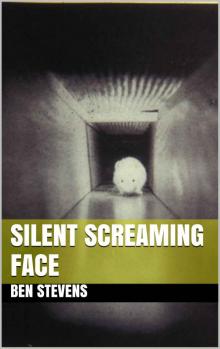 Silent Screaming Face
Silent Screaming Face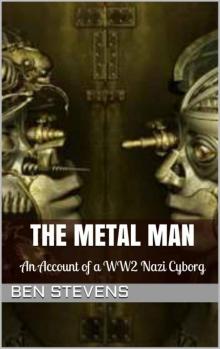 The Metal Man: An Account of a WW2 Nazi Cyborg
The Metal Man: An Account of a WW2 Nazi Cyborg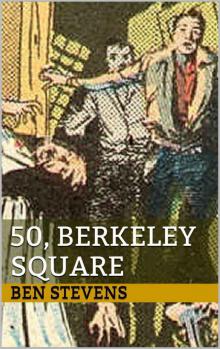 50, Berkeley Square
50, Berkeley Square A Ghost
A Ghost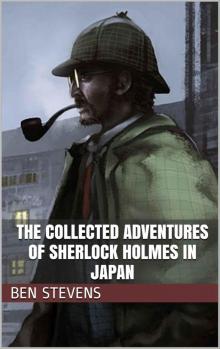 The Collected Adventures of Sherlock Holmes in Japan
The Collected Adventures of Sherlock Holmes in Japan The Nazi Murder Machine: 13 Portraits in Evil
The Nazi Murder Machine: 13 Portraits in Evil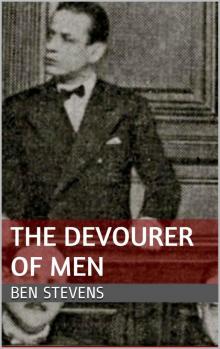 The Devourer of Men
The Devourer of Men Metal Man
Metal Man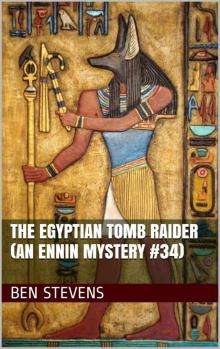 The Egyptian Tomb Raider (An Ennin Mystery #34)
The Egyptian Tomb Raider (An Ennin Mystery #34)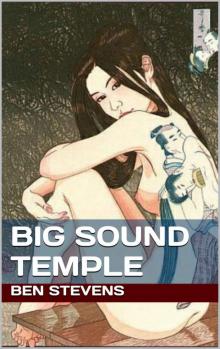 Big Sound Temple
Big Sound Temple The Ennin Mysteries: Collected Stories 26-30
The Ennin Mysteries: Collected Stories 26-30